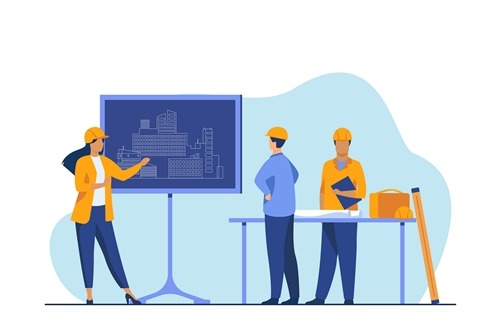Project Manager
The Project manager is responsible for the day-to-day management of the project. They will, therefore, lead the team toward the project objectives under the sponsors’ supervision. More specifically, they will help to define and refine project objectives. Additionally, they will track and report progress. When needed, they will also issue corrective action, implement workarounds and manage changes. Finally, they will close their projects properly when all the work is done.

Project Management Courses
Understanding the Project Manager role
As noted, project managers are responsible for managing the project daily. As a result, they will perform several processes that will allow the project to meet its targets. For example, project managers should help to collect, prioritize, and refine requirements. They will help to prepare performance baselines, such as the scope statement, the project schedule, and the project budget. During the project, project managers guide their teams. Additionally, they make sure that products are delivered within requirements and constraints. Moreover, they handle changes, risks, and issues that require attention. They also collect work performance data, assess variances, and report performance. Finally, when the project is nearly completed, project managers ensure that the project is closed in a controlled manner.
Exploring the Project Manager Responsibilities
A project manager may take on several responsibilities during the project. This section will explore these responsibilities.
Firstly, as part of project initiation, project managers may help to prepare a product vision and a business case. Additionally, they may help to identify, understand, and assess stakeholders. Subsequently, they may help to align stakeholders’ expectations. Finally, project managers may help to prepare a product vision and issue a project charter.
Secondly, as part of project planning, project managers may help to define the product and project scope. Additionally, they plan the work required to meet objectives. As part of planning, they will also sequence activities, estimate durations, estimate resources, and develop the timeline. They will determine key planning artifacts, such as the budget, the communications management plan, and the quality management plan. Finally, they will help to identify, assess, and address project risks.
Thirdly, as part of project execution, project managers should direct the daily work. Additionally, they will handle issues, and manage expectations.
Fourthly, project managers should collect and process work performance data to monitor their projects. As a result, they assess variance and forecast future performance. As the project progresses, they also report performance and benefits realization. When applicable, project managers manage changes to performance and product baselines.
Finally, project managers should close projects properly. As a result, they may help to verify the product and obtain formal acceptance. Additionally, project managers ensure a sustainable handover of project deliverables. Moreover, they help to generate and acquire lessons learned, knowledge, and documentation. Finally, project managers liberate resources.
Exploring the Project Manager Skills
Project management certainly requires a rich skill set. Firstly, project managers should have project management technical skills. Secondly, they should have strong soft skills. Lastly, project managers should have business-related skills.
Project managers should undoubtedly have project management technical skills. More specifically, they should be able to prepare project management artifacts. For example, they should be capable of defining the scope, developing a schedule, determining the budget, or preparing a quality management plan.
Project managers will surely need to prepare project management artifacts. However, many project management challenges require soft skills instead of technical skills. Therefore, project managers should be able to communicate, influence, guide, and lead. For example, project managers should be able to communicate with team members and other stakeholders. Moreover, they should be able to negotiate to align expectations and arbitrate conflict. Such challenges often require conflict management and negotiation skills. Furthermore, project managers need to address complex problems. For example, they may need to align competing priorities and expectations. Therefore, project managers need problem-solving skills.
Most project managers work in particularly challenging business environments. As a result, they should be able to understand whether the project is feasible and justifiable. Additionally, they should be able to assess how changes within their environment impact their projects’ performance and justification. They should also be able to recommend valuable changes.
Exploring Project Management Certifications
As shown above, the project manager’s role is challenging. Concurrently, it is also increasingly needed. Studies show that the demand for project managers is undeniably increasing. A project management certification can certainly help.
At this point, there are multiple project management certifications. Moreover, each certification may target different levels of project management experience and approaches. These certifications include, for example, the Project Management Professional (PMP) and the Certified Associate in Project Management (CAPM). They also include the European Certified Project Manager (EC-PM), European Certified Agile Project Manager (EC-AglPM) certifications, PRINCE2 Foundation, and PRINCE2 Practitioner.



